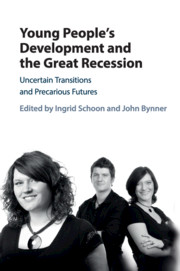Book contents
- Frontmatter
- Contents
- List of Figures
- List of Tables
- Contributors
- Acknowledgments
- Preface
- List of Abbreviations
- Part I Introduction
- Part II The Changing Context of Youth Transitions
- Part III Variations in Education and Employment Transitions during Times of Economic Hardship
- Part IV The Impact of the Great Recession on Families
- 10 Transitioning to Adulthood in the Wake of the Great Recession: Context and Consequences
- 11 Impact of the Recession on Family Dynamics and Youth Well- Being: Findings from the German Family Panel (Pairfam)
- 12 Employment and Family Transitions: Trends before and after the Great Recession
- Part V Future Orientations and Well-being
- Part VI Conclusion
- Index
- References
12 - Employment and Family Transitions: Trends before and after the Great Recession
from Part IV - The Impact of the Great Recession on Families
Published online by Cambridge University Press: 20 October 2017
- Frontmatter
- Contents
- List of Figures
- List of Tables
- Contributors
- Acknowledgments
- Preface
- List of Abbreviations
- Part I Introduction
- Part II The Changing Context of Youth Transitions
- Part III Variations in Education and Employment Transitions during Times of Economic Hardship
- Part IV The Impact of the Great Recession on Families
- 10 Transitioning to Adulthood in the Wake of the Great Recession: Context and Consequences
- 11 Impact of the Recession on Family Dynamics and Youth Well- Being: Findings from the German Family Panel (Pairfam)
- 12 Employment and Family Transitions: Trends before and after the Great Recession
- Part V Future Orientations and Well-being
- Part VI Conclusion
- Index
- References
Summary
Abstract
Did the 2008 economic recession speed up or slow down present trends toward a general prolongation of the transition to independent adulthood? This chapter examines trends in employment and family transitions before and after the Great Recession using evidence from the British Household Panel Survey (BHPS) and Understanding Society. Our analysis takes a dynamic approach incorporating life course effects and the changing labor market structure in terms of cohort and age effects. Moreover, we examine interlinkages between multiple transitions, and assess associations in the timing of education, employment, and family transitions using correlated survival models. The findings show that there is a fall in first birth rates post-recession, suggesting a reduced commitment to life altering transitions immediately following the global economic downturn. We also find an increasing association between leaving further education and forming a coresidential union, suggesting that women delay moving in with a partner until after they have completed their education. We also find a decreasing association between formation of a coresidential union and the incidence of first birth, i.e., in the direct aftermath of the recession couples delay the start of family formation. The findings suggest that the Great Recession is associated with an acceleration of preexisting trends toward a de-standardization (or decoupling) and delaying of transitions.
Introduction
Major economic downturns, such as the recent 2008 financial crash and subsequent Great Recession, affect lives on multiple levels, including consequences for employment, income, and education participation, as well as decisions regarding family formation. Although the recession affects all, young people between 16 and 25 years, embarking on making the transition to independent adulthood, are hit especially hard (Bell and Blanchflower 2011; Danzinger 2013; Jenkins et al. 2013). Young people are more likely to be unemployed, poor, and finding it more difficult to make ends meet than their older working age peers. There are, however, variations by country suggesting that social policies and institutional factors can buffer the blow (Aassve, Cottini and Vitali 2013; Ashton, this volume). In countries with relatively little support or social protection for young people, such as the UK, staying on with parents and delaying the step into family formation and parenthood reflect some of the strategies used by young people to cope with economic uncertainty.
- Type
- Chapter
- Information
- Young People's Development and the Great RecessionUncertain Transitions and Precarious Futures, pp. 297 - 318Publisher: Cambridge University PressPrint publication year: 2017
References
- 1
- Cited by



